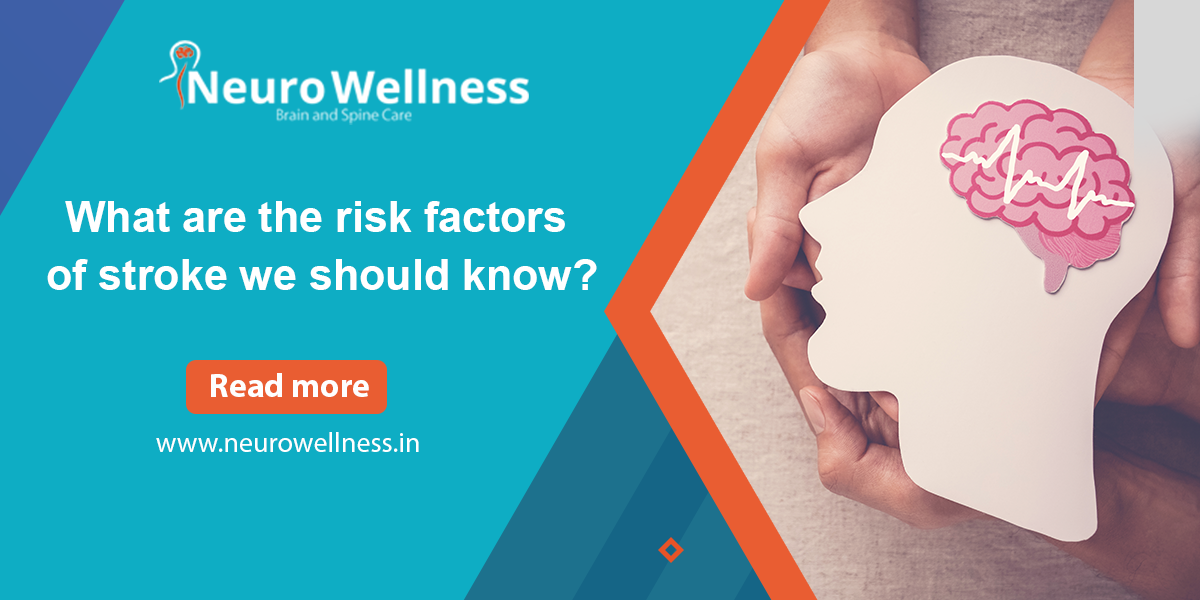A stroke can However, if you have specific risk factors, your chances of having a stroke increase. Some risk factors of stroke can be altered or managed, while others cannot. Today, an increasing number of people are putting their most valuable asset their brains under protection. Are you one of them?
What are the risk factors of stroke that cannot be modified:
1. a previous stroke or pre-existing cardiovascular disease such as a heart attack.
2. Age: 60 years old or older.
3. Family history: Members in the family that have suffered a stroke
4. Gender: Males are at a higher risk than females.
5. Race: Black, Asian, and Hispanic
6. Sickle cell disease, polycythemia, protein C/S deficiency, hyperhomocysteinemia, etc., are blood diseases that cause excessive clotting.
7. Mitral stenosis (a type of valvular disease)
8. Genetics or heredity: People with a family history of stroke have a higher risk of having a stroke.
What are the risk factors of stroke that can be modified:
Risk factors of stroke that can be altered, treated, or controlled medically include
1. High blood pressure: persistent Blood pressure of 140/90 or above can cause damage to the brain’s blood vessels (arteries).
2. Heart disease: There is a strong association between heart disease and stroke. Several types of cardiac disease are known to increase the risk of stroke. Stroke, like coronary heart disease, is a risk factor. Atherosclerosis (hardening of the arteries) increases the risk of stroke in people with coronary heart disease, angina, or who have had a heart attack.
3. Diabetes: Control your blood sugar if you have Type 1 or Type 2 diabetes. Diabetes mellitus is a risk factor for stroke on its own. Many diabetics also have high blood pressure, high cholesterol, and are overweight, all of which increase their risk. Even though diabetes is curable, it still raises your risk of stroke.
4. Smoking: Cigarette smoke contains nicotine and carbon monoxide, which harms the cardiovascular system and increases the risk of stroke. When birth control tablets are taken with cigarette smoking, the risk of stroke is considerably increased.
5. History of TIAs: Mini-strokes is a term used to describe TIAs. The symptoms are similar to those of a stroke, although they don’t stay as long. You’re almost ten times more likely to suffer a stroke if you’ve had one or more TIAs than someone your age and sex who hasn’t.
6. High red blood cell count: The blood thickens and clots are more likely when the quantity of red blood cells increases significantly. This increases the chances of having a stroke.
7. High blood cholesterol and lipids: High cholesterol levels can contribute to artery thickening or hardening (atherosclerosis), which is caused by plaque buildup. Plaque is a buildup of fatty substances, cholesterol, and calcium in the arteries. The amount of blood flow to the brain can be reduced by plaque accumulation on the inside of the arterial walls. When the brain’s blood supply is cut off, a stroke develops.
8. Lack of physical activity
9. Obesity
10. Excessive alcohol consumption: Blood pressure rises if you drink more than two drinks every day. Stroke can occur as a result of binge drinking.
11. Illegal drugs: Abuse of intravenous (IV) drugs increases the risk of a stroke due to blood clots (cerebral embolisms). Cocaine and other narcotics have been linked to heart attacks, strokes, and a variety of other cardiovascular issues.
12. Abnormal heart rhythm: Some types of heart disease can increase your chances of having a stroke. The most potent and modifiable heart risk factor for stroke is having an abnormal heartbeat (atrial fibrillation).
13. Cardiac structural abnormalities: Long-term (chronic) heart damage can be caused by damaged heart valves (valvular heart disease). This can increase your risk of stroke over time.
Other risk factors of the stroke to consider are:
Where you reside: Strokes are more common in the southeast than in other parts of the country. This could be due to variances in lifestyle, race, smoking habits, and diet between regions.
Temperature, season, and climate: Stroke deaths are more common during periods of excessive heat.
Social and economic factors: Strokes are more likely in low-income people, according to some studies.
Neurowellness provides high-quality Advanced Stroke treatment in Bangalore at an affordable cost in comparison with the other medical treatment options worldwide.

